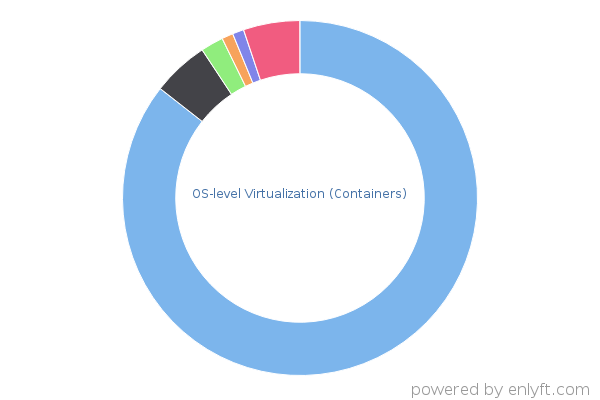OS-level Virtualization (Containers) products
149,125 Companies
What is OS-level Virtualization (Containers)?
Operating-system-level virtualization, also known as containerization, refers to an operating system feature in which the kernel allows the existence of multiple isolated user-space instances. Such instances, called containers, partitions, virtualization engines (VEs) or jails (FreeBSD jail or chroot jail), may look like real computers from the point of view of programs running in them. Programs running inside a container can only see the container's contents and devices assigned to the container. Operating-system-level virtualization is commonly used in virtual hosting environments, where it is useful for securely allocating finite hardware resources among a large number of mutually-distrusting users.
Market Share of OS-level Virtualization (Containers) products
At enlyft, we use sophisticated, patent-pending algorithms to track the use of various OS-level Virtualization (Containers) products and technologies. We track 34 products in the OS-level Virtualization (Containers) category, and have found 149,125 companies using these products.


Target customers using OS-level Virtualization (Containers) products to accomplish your sales and marketing goals.
| Product |
Install base
# of companies we found using this product |
Market Share |
|---|---|---|
| Docker | 125,352 | 84% |
| Docker Swarm | 7,470 | < 5% |
| Shippable | 3,963 | < 5% |
| Google Container Engine | 2,002 | < 5% |
| Amazon EC2 Container Service | 1,770 | < 5% |
| OpenShift Container Platform | 1,639 | < 5% |
| Twistlock | 1,200 | < 5% |
| Rancher | 946 | < 5% |
| Apache Mesos | 931 | < 5% |
| Sysdig | 847 | < 5% |
| DC/OS | 824 | < 5% |
| Azure Container Service | 455 | < 5% |
| Anchore | 402 | < 5% |
| Containership Cloud | 252 | < 5% |
| Portworx | 237 | < 5% |
| Aqua | 174 | < 5% |
| NeuVector | 75 | < 5% |
| Weaveworks | 75 | < 5% |
| Apprenda | 69 | < 5% |
| Docker Datacenter | 63 | < 5% |
| Kata Containers | 51 | < 5% |
| Singularity | 46 | < 5% |
| Apcera | 41 | < 5% |
| Microsoft Azure Container Apps | 41 | < 5% |
| Kontena | 34 | < 5% |
| Marathon | 29 | < 5% |
| LXC | 25 | < 5% |
| Cloud 66 for Containers | 20 | < 5% |
| AWS Copilot | 20 | < 5% |
| StorageOS | 19 | < 5% |
| Triton SmartOS | 16 | < 5% |
| rkt | 15 | < 5% |
| Portainer | 11 | < 5% |
| BlueData | 11 | < 5% |








